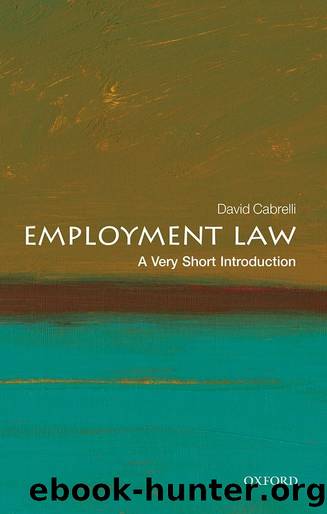Employment Law by David Cabrelli

Author:David Cabrelli [Cabrelli, David]
Language: eng
Format: epub
ISBN: 9780192551306
Publisher: OUP Oxford
Published: 2021-12-28T00:00:00+00:00
Which groups should equality laws âprotectâ?
A separate question worthy of our consideration concerns the groups that should fall within the protective scope of labour laws. For example, we have already drawn attention to the fact that race and sex are protected characteristics recognized by the law. One theory claims that the criteria of race and sex share something in common, namely âimmutabilityâ. The argument from âimmutabilityâ provides that where employer decision-making on job hires, promotion, and worker discharges is motivated by criteria that people cannot change about themselves and which are unchosen, then workplace practices discriminating against people in these groups ought to be addressed by discrimination laws. These criteria are seen to be intrinsic parts of an individualâs identity and immutable: hence the term âthe politics of identityâ. For example, individuals belonging to a particular racial or ethnic group or who are female neither have the capacity to change these characteristics, nor did they choose the race or biological sex that they were born with. In such circumstances, the immutability theory posits that if employers take into account these criteria in their decision-making, that is illegitimate since it demeans and debases the dignity of individuals. In the final analysis, legal stepsâvia discrimination lawsâare essential to discourage employers from considering them in their decision-making processes.
However, if we take the immutability theory to its logical conclusion, it could easily lead to the âproliferation of the protectorateâ, in the memorable words of professor of law Owen Fiss. In essence, this means that there could be scope for limitless expansion of the protected characteristics recognized by the law. For example, the criteria of disability, sexual orientation, and age are also immutable characteristics and as such, by this theory, should be added to the list of protected groups. And where then do we draw the line? For example, why should âobesityâ and âpolyamoryâ not be included? So far, a line has been drawn by legal systems that extends beyond the classic âcoreâ of race and sex. For example, in the USA and European Union, workers belonging to groups such as the disabled, or who are lesbian, gay, bisexual, or transsexual, are recognized as having legal discrimination protection, as is the criterion of age protected. In the UK and EU, religious beliefs are also legally protected.
Another challenge for the immutability premise is that we might question whether these characteristics of race, sex, disability, sexual orientation, age, and religious belief can each be treated as truly immutable. For instance, some would dismiss the idea that a religious belief or someoneâs sex or sexual orientation are immutable, since they are open to change, for example by converting from Buddhism to Christianity, undergoing a sex-change operation, or deciding to divorce oneâs husband and take a lesbian lover.
Of course, it is disputed whether these characteristics are indeed mutable, but if we leave our reservations to one side for a moment and accept this claim, what other underlying feature or factor might each of these criteria share in common? A
Download
This site does not store any files on its server. We only index and link to content provided by other sites. Please contact the content providers to delete copyright contents if any and email us, we'll remove relevant links or contents immediately.
The Future Internet by Bernard Marr(532)
Focus Group Methodology by Pranee Liamputtong(501)
Python for Finance Cookbook by Lewinson Eryk;(461)
Empowering Public Speaking by Deanna L. Fasset & Keith Nainby(429)
Doing business with Japan : successful strategies for intercultural communication by Kazuo Nishiyama(410)
Global Orders and Civilizations : Perspectives from History, Philosophy and International Relations by Sadik Unay; Muzaffer Senel(339)
Engaging with Ethics in International Criminological Research by Michael Adorjan Rose Ricciardelli(318)
Intentional Power: The 6 Essential Leadership Skills For Triple Bottom Line Impact by Lisen Stromberg & JeanAnn Nichols & Corey Jones(286)
Analysis of Financial Statements by Frank J. Fabozzi & Frank J. Fabozzi(284)
The Three Skills of Top Trading by Hank Pruden(272)
The Economics of Banking by Jin Cao(270)
Entrepreneurial Marketing by unknow(268)
Focus on Teaching by Jim Knight(256)
The Oxford Handbook of Banking and Financial History by Youssef Cassis;Richard S. Grossman;Catherine R. Schenk;(252)
New India by Arvind Panagariya(242)
Data Science and Analytics for SMEs: Consulting, Tools, Practical Use Cases by Afolabi Ibukun Tolulope(239)
Building a Career in Cybersecurity: The Strategy and Skills You Need to Succeed by Yuri Diogenes(238)
Financial Statement Analysis by Martin S. Fridson;Fernando Alvarez; & Fernando Alvarez(233)
Maximum Success with LinkedIn by Dan Sherman(216)
